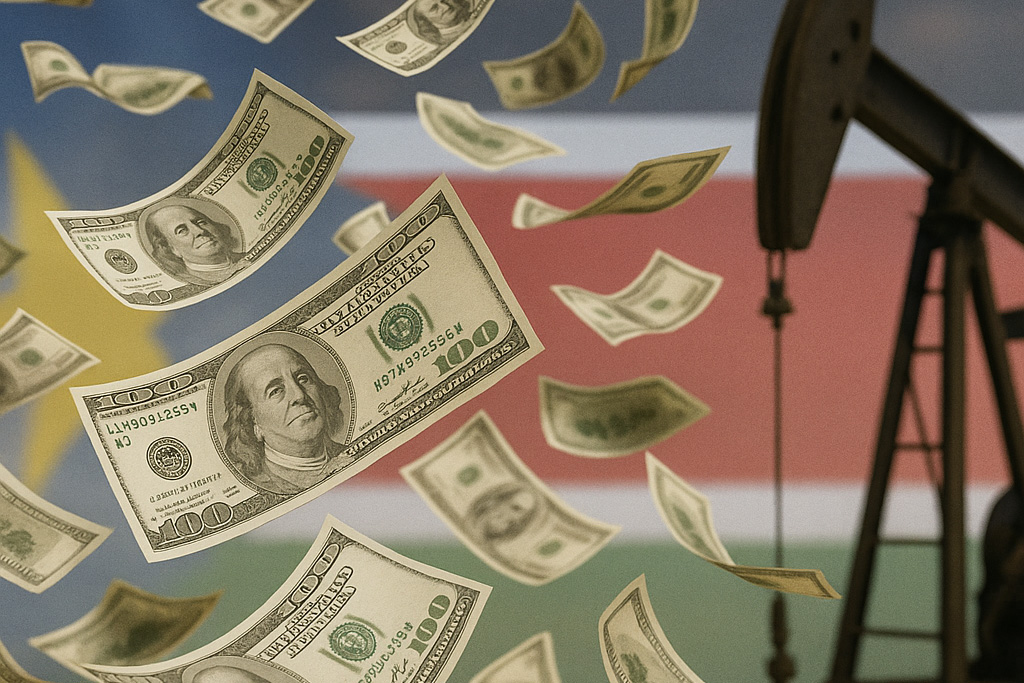A new investigation by Afrik.com has laid bare what it calls “one of the most alarming cases of state capture in Africa’s oil sector.” At the center of this shadowy system stands one man: Engineer Deng Lual Wol, the Undersecretary of the Ministry of Petroleum — now described as the most powerful and least accountable figure in our government.
The Disappearing Billions
While 7.7 million South Sudanese live in hunger and 92 percent of citizens face poverty, Afrik.com reports that billions of dollars in oil revenues have vanished without trace. More than 25 cargoes of crude oil, worth hundreds of millions, have “evaporated” from official records, with neither the Ministry of Finance nor the Central Bank able to explain where the money went.
For a nation where oil provides nearly 90 percent of public income, the implications are catastrophic. Officials interviewed by Afrik.com describe a ministry “completely beyond supervision,” operating as a state within the state, untouchable and opaque.
The UN Human Rights Commission, in a report published in September 2025, documented $25.2 billion in oil revenues and oil-backed loans since 2011 — “the use of which remains almost entirely unknown.” The report accuses a “narrow elite” of diverting the nation’s wealth for personal enrichment.
The Man Who Knows Everything
That elite, several sources agree, revolves around Eng. Deng Lual Wol. As Undersecretary, he controls the entire chain of decision-making — from licensing traders to allocating cargoes and managing proceeds.
“Nothing happens in the oil sector without Deng Lual Wol’s approval,” a senior civil servant told Afrik.com under condition of anonymity. “He is the only man who truly knows how much oil leaves the country, who buys it, and where the money ends up.”
Under his command, the Ministry of Petroleum has ceased publishing its annual reports since May 2021, erasing all public transparency. Even the Central Bank no longer receives regular transfers from oil exports, leaving national reserves dry and the South Sudanese pound in free fall.
Ghost Traders and Secret Deals
Global oil giants — Vitol, Trafigura, Glencore — have quietly left South Sudan, unwilling to face the growing opacity. They have been replaced by little-known firms with no record in oil trading, some not even using standard prepayment systems.
One of them, EuroAmerican Energy, led by Sudanese businessman Idris Taha, has in a matter of months captured a large share of South Sudan’s exports. Afrik.com notes that the company operates outside traditional payment channels — a pattern that fuels suspicions of off-market deals.
On social media, the public has increasingly accused Eng. Deng Lual Wol and businessman Benjamin Bol Mel of orchestrating a network of secret contracts benefiting a privileged few.
The UN report adds that “tenders, when they exist, are manipulated,” with shipments ending up in the hands of “friendly” traders, including some dealing with countries under sanctions.
Silencing Oversight, Weakening the State
Until recently, the last man able to challenge this growing power was General Manassa Machar Bol, a feared figure known for his strict oversight of the oil sector. After years of resisting ministerial interference, he was abruptly dismissed and sent back to his barracks.
That removal, analysts say, was symbolic: even the army — long viewed as South Sudan’s last line against corruption — has been sidelined.
Today, the Anti-Corruption Commission has been evicted from its offices for unpaid rent, and its budget cut to 0.01 percent of national expenditure. The Audit Chamber receives less than 0.1 percent. Every mechanism of control has been dismantled, leaving the Ministry of Petroleum to govern in the dark.
The Human Cost of an Elite’s Greed
While oil wealth disappears offshore, the human toll grows unbearable. Millions are starving. Soldiers and teachers go unpaid. The UN Development Index ranks South Sudan 192nd of 193 countries.
The health sector, which should receive 2.5% of the national budget, got only 0.7% in 2023–24. Education received 1.5% instead of the legal 10%. Yet, as Afrik.com points out, “more money was allocated to the Presidential Medical Unit than to the entire national health system.”
The much-publicized “Oil for Roads” program, launched in 2020, has consumed $2.2 billion, with less than 5 percent of projects meeting construction standards. $1.7 billion remains unaccounted for.
A Nation on the Edge
Observers warn that when civil institutions become too corrupt to govern, the military may once again be tempted to step in. “If the civilian elite continues to plunder the country, the army will eventually feel compelled to restore order,” said a Juba-based political analyst.
The idea of a return to military control alarms many South Sudanese — yet, for some, it now feels inevitable. “When leaders treat public resources like private property,” one citizen told a local paper, “the soldiers will not watch forever.”
A Call for Clarity and Accountability
The allegations published by Afrik.com are serious, and they call for a transparent response from the Ministry of Petroleum and the Government of South Sudan. Eng. Deng Lual Wol remains a key figure in national economic management, and the public deserves clarity regarding the handling of oil revenues — the very backbone of our nation’s future.
At a time when hunger, poverty, and despair are rising, citizens need more than words. They need assurance that their country’s wealth serves the people — not a few individuals.


